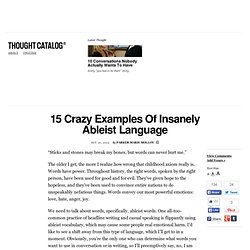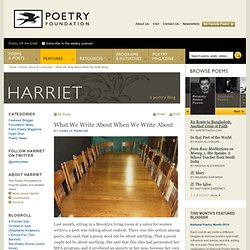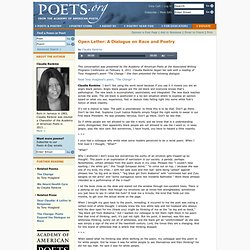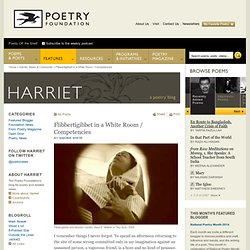

Games-theater-of-oppressed. 15 Crazy Examples Of Insanely Ableist Language. “Sticks and stones may break my bones, but words can never hurt me.”

The older I get, the more I realize how wrong that childhood axiom really is. Words have power. Throughout history, the right words, spoken by the right person, have been used for good and for evil. They’ve given hope to the hopeless, and they’ve been used to convince entire nations to do unspeakably nefarious things. Words convey our most powerful emotions: love, hate, anger, joy. We need to talk about words, specifically, ableist words. Ableist language is any word or phrase that intentionally or inadvertently targets an individual with a disability.For the most part, these words are filler, nothing more. Each of these words, when used flippantly, can be extremely insulting to individuals who find themselves with physical (“lame,” “invalid,” “dumb”) or mental (“crazy,” “retarded,” “psycho”) disabilities. I was reading through the latest issue of Cosmopolitan (don’t judge me).
What We Write About When We Write About : Camille Rankine : Harriet the Blog. By Camille Rankine Last month, sitting in a Brooklyn living room at a salon for women writers, a poet was talking about content.

There was this notion among poets, she said, that a poem need not be about anything. That a poem ought not be about anything. She said that this idea had permeated her MFA program, and it produced an anxiety in her now, because her own recent work was very much about things. I perked up. I’ve been sorting through these suspicions that there exists a certain prejudice against poetry that addresses and expresses ideas about the world, people, history, society—poetry with purpose. The poet who broached this issue at the salon had noticed a trend: this attitude comes most often from a particular population of poets and critics—often male, often white, often of a certain socio-economic class. In response to the question, “What’s African American about African American poetry?”
Open Letter: A Dialogue on Race and Poetry by Claudia Rankine. This conversation was presented by the Academy of American Poets at the Associated Writing Programs Conference on February 4, 2011.

Claudia Rankine began her talk with a reading of Tony Hoagland's poem "The Change. " She then presented the following dialogue. Read Tony Hoagland's poem, "The Change" > Claudia Rankine: I don't like using the word racist because if you use it it means you are an angry black person. Angry black people are the old black and everyone knows that's pathological.
It's not a chance to take. So if white people are not allowed to use the n-word, and we know that is a understanding rarely disregarded, then apparently black people are not allowed to use the r-word or, in news jargon, play the race card. I once had a colleague who wrote what some readers perceived to be a racist poem. "What! " What if people told European history like they told Native American history?
The first immigrants to Europe arrived thousands of years ago from central Asia.

Most pre-contact Europeans lived together in small villages. Because the continent was very crowded, their lives were ruled by strict hierarchies within the family and outside it to control resources. Europe was highly multi-ethnic, and most tribes were ruled by hereditary leaders who commanded the majority “commoners.” These groups were engaged in near constant warfare.Pre-contact Europeans wore clothing made of natural materials such as animal skin and plant and animal-based textiles.
Women wore long dresses and covered their hair, and men wore tunics and leggings. And these three paragraphs are the only mention of European history before the year 1500. Why do you include those “pre-contact” European things? Like this: Like Loading... Flibbertigibbet in a White Room / Competencies : Simone White : Harriet the Blog.
By Simone White Fibbergibbet and Mumbo Jumbo: Kara E.

Walker in Two Acts, 2004. I remember things I never forgot. To spend an afternoon returning to the site of some wrong committed only in my imagination against an unnamed person, a vaporous friend, is a bore and no kind of penance. What have I neglected? Probably, it is impossible to avoid insult in the atmosphere of feint, desperation and cluelessness that pervades this life. There has never been a moment when the world I lived in did not claim to be mostly-white, all-white, white-shoe, majority-white, elite-white and meanwhile the family I was in, the neighborhood I was in, the love I was in, the music I was in-to, the clothes, the mood, the writing were most(ly)-black. I mean, part of the investigation has to be losing track of the way of doing the work. I didn’t know it that night, but I was just the tiniest bit pregnant. Same room, different night.